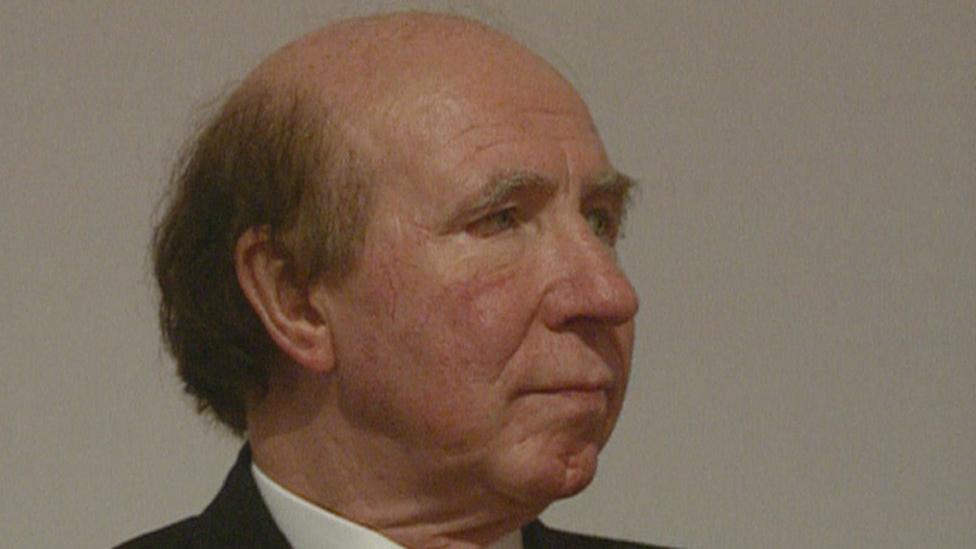Former Glasgow lord provost Pat Lally dies aged 92
- Published

Pat Lally, the former lord provost of Glasgow and leader of the city's council, has died aged 92.
The Labour politician retired from local government in 1999 after more than 33 years in politics.
Mr Lally was nicknamed Lazarus because of his numerous political comebacks
Prior to local government reorganisation in the 1990s, he was leader of Glasgow District Council, before going on to be the city's Lord Provost from 1996 till 1999.
He was credited with playing an important part in the success off the 1988 Glasgow Garden Festival, Glasgow becoming European City of Culture in 1990, and European City of Architecture in 1999.
Mr Lally was temporarily suspended by the Labour party in 1997 over a "votes for trips" scandal.
But the suspension was lifted after he took the party to the Court of Session.
'Rarely out of the news'
He was born and brought up in the Gorbals area of Glasgow, working initially in the clothing trade before going on to serve as a radar operator in the RAF during the Second World War.
He joined the Labour Party in 1950 and was elected as a Glasgow Corporation councillor in 1966.
He quit the Labour Party in 2003, and was unsuccessful three times in bids to be elected to the Scottish Parliament.
His friend and biographer Neil Baxter said: "For nearly two decades Pat Lally was Scotland's highest-profile local politician.
"Widely credited with transforming his city's image through its inspired promotion under the cultural banner, he was driven, determined, inspiring, charismatic and rarely out of the news.
"He also had a sparkling sense of humour. Not averse to courting controversy if he felt it was in the interests of the people of Glasgow, Pat Lally bravely fought off a series of personal attacks, secure in the knowledge that he had dedicated his career to serving the city he loved with vision, passion and integrity.
"Pat's wife Peggy, to whom he was devoted, died in 2007. She had served alongside him during his provostship and as lady provost dedicated tremendous energy and goodwill to many charitable causes."
His two sons Derek and Robert also paid tribute, saying: "We are very proud of all that our dad achieved and of his contribution to Glasgow and Scotland.
"A passionate Glaswegian, he was also a dedicated family man and a devoted husband, father and grandfather."
Glasgow City Council leader Susan Aitken said: "I only met Pat a few times, but recall the politeness of an old-school gentleman combined with a very dry wit. He was a very funny and interesting man.
"Pat was a local politician who had an impact well beyond the local. He believed that Glasgow's ambitions should be limitless and that Glaswegians deserved the best.
"For Pat, local government was not just about delivering services. It was about lifting the aspirations of our citizens. I often think of him when I visit our fab concert hall. He took a lot of criticism at the time but has been vindicated by the venue's massive success."

The effective operator who could never be counted out
by Reevel Alderson, BBC Scotland Home Affairs Correspondent
Pat Lally was a highly effective local operator whose ability to spring back from political set-backs led to his surname being corrupted to Lazarus.
He was twice suspended by the Labour party, and each time returned triumphantly to City Chambers remarking: "Lazarus only came back once."
He led Glasgow district council before local government re-organisation, and after it was the first Lord Provost of the new city authority.
His career in local government spanned more than three decades, as did his achievements.
In the early 1970s, as tenement demolition was gathering pace in Glasgow he was behind a campaign to provide inside toilets for the first time for many blocks - dubbed Lally's lavvies."
Towards the end of his political life, he was also a leading figure in the provision of Glasgow's Royal Concert Hall, a building affectionately nicknamed "Lally's Palais," and of the city's successful bid to be named UK City of Architecture and Design in 1999.
He left the Labour Party to stand unsuccessfully three times for Holyrood - once for a senior citizens' party - he was always a charismatic figure, invariably immaculately turned out in suit and tie, the legacy, he said of his time in the clothing trade.
